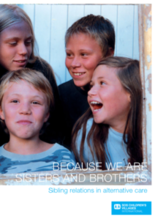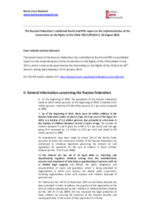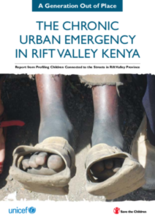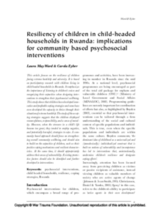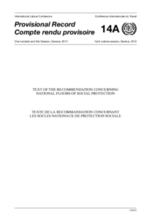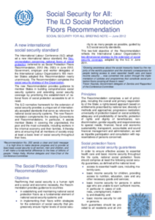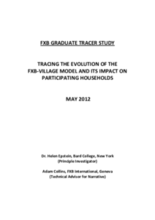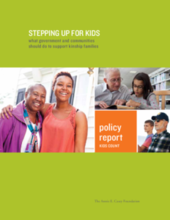Displaying 411 - 420 of 510
This publication by SOS Children’s Villages International brings together research findings, learning and policy recommendations about sibling relations in alternative care gathered from five different SOS Children’s Villages associations (Germany, Austria, France, Italy, and Spain).
Care related sections of the Government of the Russian Federation's fourth and fifth combined report on the implementation of the Convention on the Rights of the Child (dated 3rd June 2011).
Helping families and their kin develop care plans for orphaned and vulnerable children was the objective of the family group conferencing (FGC) training that took place in Guatemala City from July 10-12, 2012. This family preservation approach for developing strategies to prevent the institutionalization of children emphasizes the strengths of families and their capacity to solve their own problems and develop their own care plans.
Research was conducted in five Rift Valley towns in Kenya in 2011 to understand the link between emergencies and the perceived increase of children joining the streets. Findings show that emergencies such as Post Election Violence and drought have caused children to join the streets. By far the biggest reason for children joining the streets was food insecurity. The authors advocate for an urgent, large-scale response to place children currently connected to the streets in durable situations in tandem with a multi-sectorial development approach to tackle and address the root of the crisis.
This article describes the results of a meta-analytic review aimed at providing an estimate of the prevalence of physical and emotional neglect by integrating prevalence figures from the body of research reporting on neglect. It discusses and makes recommendations on the dearth of studies investigating the prevalence of child neglect, despite evidence of its severe consequences on millions of children, and a global prevalence estimated to be above 15%.
Based on participatory research with children living in child headed households in Rwanda, this article focuses on the resilience of children facing extreme hardship and adversity. While the research focuses on child headed households, this study’s findings can be considered more broadly for interventions for other vulnerable children to support their development of innovative coping strategies.
This International Labour Organization (ILO) document introduces a new international standard adopted in June 2012, the Social Protection Floors Recommendation, 2012 (No. 202), that provides guidance to member States in building comprehensive social security systems and extending social security coverage by prioritizing the establishment of national floors of social protection accessible to all in need.
This International Labour Organization (ILO) brief introduces a new international standard adopted in June 2012, the Social Protection Floors Recommendation, 2012 (No. 202), that provides guidance to member States in building comprehensive social security systems and extending social security coverage by prioritizing the establishment of national floors of social protection accessible to all in need.
Study tracing impact of FXB International's community-driven “FXB-Village” model on graduates of the program. The models is a structured program of household support and economic strengthening designed to empower particularly vulnerable families to escape extreme poverty and ensure the enduring wellbeing of the children in their care.
This comprehensive policy report by the Annie E. Casey Foundation summarizes what is known about kinship care in the United States, identifies the problems and issues these families face, and recommends how best to support caregivers as they step up to take responsibility for children in their extended families and communities.

